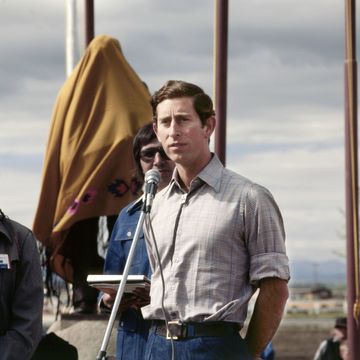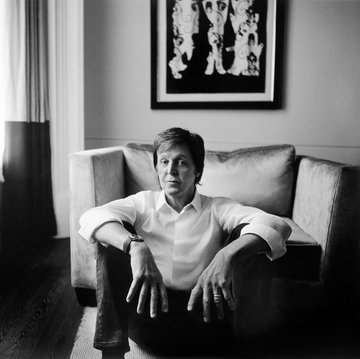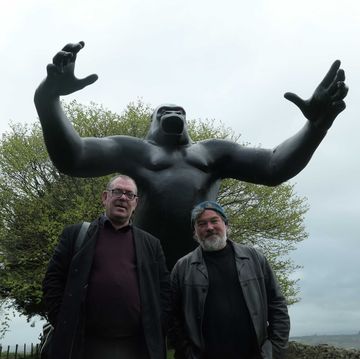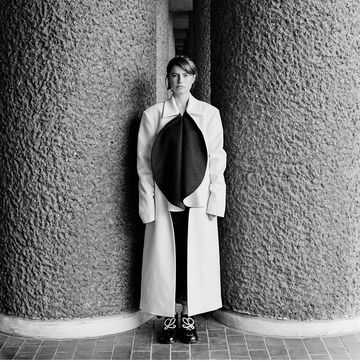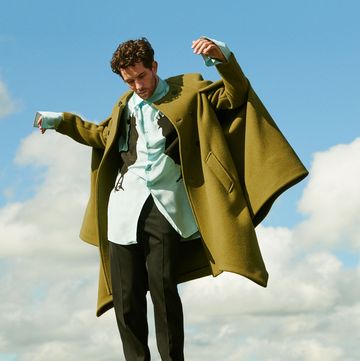When do we start
With those four words, Adrian Gill did me perhaps the greatest service of my professional life. And for all the many other words and sentences and paragraphs he and I exchanged in the 16 years we worked together, including all the many coruscating pieces he dictated to me over the phone, and the countless clever and wise and compassionate and funny and unrepeatably rude things he said to me in conversation, those four are the ones I thought of first, and have talked about most since 10 December, when I heard, along with everyone else, that Adrian — who was, among many other things, this magazine's Special Contributing Editor (Agony) — had died. (That bracketed "Agony" had multiple meanings, as I hope will become clear.)
When do we start
No punctuation. He was famously and profoundly dyslexic; he didn't do punctuation, or paragraphs, or capital letters, or any of that. No embroidery. No endearments: no "Dear Alex" or "Yours, Adrian." Just those four words.
When do we start
They arrived late on a December evening in 2010, in reply to a round-robin email I'd sent a few hours earlier, telling my friends and colleagues that I was leaving my job on the features desk at GQ, after 11 years, to become editor of Esquire.
Adrian's message was one of faith and encouragement. He was saying: I'm coming with you. And he was also saying, to me and everyone else who might have cared: this is going to be OK, it might even be fun. I hope and believe it was.
He didn't have to do it. I hadn't asked him to do it. I didn't expect him to do it, and I'm certain no one else did, either. He did it because he was loyal, he was generous and he was kind. He did it because he could. That was the beauty of it.
Naturally, it meant far more to me than it did to him. How could it not? I was a mid-level magazine hack with crumbs on my jumper and fear in my heart — yes, I know, I still am — suddenly over-promoted to one of the great jobs in print journalism, with no idea if I could pull it off. He was perhaps the most famous newspaper writer in Britain, one of Fleet Street's all-time greats, the scalpel-sharp critic and feature writer for The Sunday Times, celebrated for his merciless skewerings of second-rate restaurants and his joyful demolitions of terrible TV shows, as well as for his kaleidoscopic travel writing, and his unflinching dispatches from some of the world's poorest, most dangerous, most benighted places. His public vote of confidence gave the best possible start to my editorship.
Uncle Dysfunctional was my idea. I thought Adrian should be for the readers of Esquire what he had, over the previous decade, become for me: a rogue relation, older, cleverer and braver than me, also bolshier, madder, and much more difficult. And funnier. Before anything else, he was funny.
He went for it straight away. He loved the silly name. (I nicked it from the title of a Happy Mondays album.) Even over the phone, you could almost see the gleam in his eye. I knew Unc, as Adrian called him, would be worldly, and witty and waspish. I knew he would be honest and uncompromising. I knew he would be filthy. I knew he would make you laugh, make you think. But I had no idea where Adrian would go with him, or how far. Much farther than I could have imagined, at times much farther than I would have wished, and then farther still. In a little under six years he wrote nearly 60 columns and believe me, he had no intention of stopping. By the end they were surrealist mini-masterpieces, gob-stoppingly weird. One of them, phantasmagorically, was written by the ghost of Florence Nightingale. His last one — though none of us knew it would be, including him — purported to be a fantastically (or perhaps authentically) misogynist diatribe from Donald Trump.
He was tickled by Esquire readers' responses to the Unc columns. "It's the one thing that people come up to me in the street about," he once said. "They don't come up and talk to me about food and television, or African politics. But they will ask me about Esquire. The thing that everybody says is, 'Are the questions real?' And they are real. The fact they're written by me doesn't make them unreal. I always say, 'Yes, they are. Trust me: I'm Uncle Dysfunctional.'"
He was chuffed, too, that Esquire's youngest readers found the scatological gags and the flamboyant swearing funny. But Uncle Dysfunctional offered more, much more, than pungent puerility and crazed flights of fancy. There was profundity, too, and serious points were made — about what it means to be a man, about sex and sexuality, women and children, wives and girlfriends, parents and friends, work and play, ethics and morality — but he never, ever let more important concerns get in the way of a good knob joke. Frequently, I would complain to him that he was going too far, that the column was too obscene, that we couldn't possibly publish it, that he'd have me up on charges of indecency. "You're going to get me sacked," I'd moan. "Good! You should be sacked!"
I've never met anyone who so delighted in the use of the word "cunt", in print and in person; I have text messages still on my phone that consist of little but that word, repeated. A representative series from last autumn. First message: Call me you cunt. Second message: Not call me — you cunt. Third message: Your a cunt, call. Not Adrian at his most Addison DeWitt, granted, but it made me laugh at the time. And I did call him. "Hello, you cunt," I said. "Hello, darling," he replied.
When someone celebrated dies, there is usually an unedifying rush to claim glory by association. Adrian's death made headlines around the world. He was only 62. He had only recently been diagnosed with cancer and he had already written, courageously and brilliantly, about his illness for The Sunday Times. I don't claim for a moment that the work he did for Esquire was his most consequential. His reputation rests principally on his columns and features for The Sunday Times, and rightly so: for many of us, he was an essential part of the weekend, and he had been for 23 years. I'm proud to have played a small part in a few of the many stories collected in his numerous anthologies, but hardly any of them had anything to do with me.
I also don't want to pretend to an intimacy that didn't exist. I saw Adrian in the flesh only occasionally. We'd have lunch — The Wolseley, mostly, and a few times I was his date for a restaurant review, on which occasions it was difficult not to wince at the terror in the eyes of the front of house staff (one can only speculate at the panic in the kitchen) — and then perhaps we'd wander through Mayfair, maybe stopping so he could buy a stupidly expensive hat for his collection of stupid and expensive hats. But for the most part ours was a relationship conducted by phone. We spoke often and at length. And over the years he became more than a colleague. He was a mentor. He advised me, he admonished me, he educated me, and he made me laugh like a naughty schoolboy.
He was a naughty schoolboy himself, and like one of those he could be a nightmare. He drove me to distraction. He missed deadlines, disappeared to the other side of the world without warning or explanation when I was relying on him to file his copy, then rang me, apparently to do just that, at the weekend, or when he knew I was on holiday, or at Christmas, leaving mock-outraged voicemails wondering why I was ignoring him. Then when I called him back he'd giggle and say he hadn't done it.
Three days after his death, I gave a speech in his memory to the staff and contributors of Esquire, at our Christmas lunch. This is a gathering at which Adrian had become a fixture, making disobliging remarks about the food, fiddling unnervingly with his worry beads (a habit almost as irritating as the monocle he'd affected as a younger man), grinning malevolently at me, and generally living up to his reputation for being a devil in a bow tie. On this most recent occasion, in December, I reminded everyone of the time, five years previously, at Mark Hix's restaurant in Soho, when I had stood up to make my first festive Esquire address. (It's like the Queen's Speech, but with fewer belly laughs.) Always a nervous public speaker, I was dry-mouthed and my hand trembled as I held the typed pages. Adrian was sitting next to me. I tapped my knife on my wine glass for attention and cleared my throat to begin. Suddenly, he shot out a fist, a rattlesnake pouncing on a baby mouse, and ripped the pages from me. When I went to grab them back, he started to stuff them into his mouth. An indecorous and frankly pathetic struggle ensued, as in an overcooked farce, two fops fighting over a sheaf of weak witticisms. I won — I was the more desperate of the two of us, by some distance — and, having retrieved them from him, flushed and shaken, I began to read from my crumpled notes. That really happened: Adrian tried to eat my speech.
He was a menace, then, but never a bully. He only picked on those of us who could take it, who deserved it. That old line about the job of the journalist being to afflict the comfortable and comfort the afflicted: that was Adrian. He made exceptions, notoriously, for the Welsh — "immoral liars, stunted, bigoted, dark, ugly, pugnacious little trolls" — and the Albanians — "short and ferret-faced, with the unisex stumpy, slightly bowed legs of Shetland ponies" — and Mary Beard, and that poor baboon he inexplicably assassinated, and quite a few others, but for the most part he was for the underdog, the powerless, the downtrodden. With posturing celebrity chefs and preening TV personalities and venal politicians and self-aggrandising media mandarins he was vicious, a brute. He loved showbiz, glamour, society — the son of an actress and a TV director, Adrian was a card-carrying luvvie. But he never, ever allowed his celestial connections to interfere with his job of pricking pomposity, calling out the lazy, the cynical, the corrupt.
With victims of conflict and disease, he was empathetic — an essential quality in a writer, you'd think, but one all too often lacking — and partial: he was on their side. I can't think of another writer likely, as Adrian did in 2014, to win, in the same year, an Amnesty award for his foreign reporting and the Hatchet Job of the Year for his criticism. The former was for a series of blistering features on the plight of refugees in Congo, Jordan and Lampedusa. The latter prize was for his review of Morrissey's Autobiography, which he described as "a cacophony of jangling, misheard and misused words" written by "plainly the most ornery, cantankerous, entitled, whingeing, self-martyred human being who ever drew breath. And those are just his good qualities."
Like all the best journalists, he was entirely irreverent. One of the few times I saw him angry was when I once suggested that there might be nothing intrinsically wrong with journalists accepting honours, and that were there to be some cosmic clerical error and he were offered an OBE, or whatever, there'd be no shame in his accepting it. He was flabbergasted by this. It was the opposite of what a journalist should aim for. We are the fourth estate, we are outsiders, critics. He looked and sounded and even behaved, at times, like a toff — it was all a put-on, really — and he was closer to power than most, but the Establishment was the enemy. The Royals, he wrote only a few months ago, in a review of the Netflix show The Crown, are "a not very bright, stifled and frightened family, looking out at a world they don't understand and don't really like." Do not arise, Sir Adrian.
Much ink has already been spilled about the qualities that made Adrian's such a distinctive voice, about how his skill as a painter, his dyslexia — it's said that he saw in images rather than words — gave his writing its originality. Also about his many past lives: the miserable, stammering schoolboy; the art school dropout; the junkie alcoholic; the late, unlikely but defining discovery of his gift as a writer; the dandy's wardrobe; the public spats; the wicked fun he had; the happiness of his adult life (he was besotted with his partner, Nicola Formby, and he spoke frequently and rapturously of each of his four children); also his trials and tribulations. (For a lip-smacking account of his younger, drinking years, treat yourself to a snifter of his 2015 memoir, Pour Me.)
But this is a tribute to a friend and colleague, not an obit or a critique of his work. By the time I met him, in 2000, he was a star, as close to a celebrity as a newspaper journalist could be. Over the following decade I became one of his numerous editors. But "editor" isn't quite right. It's not right at all. "Stenographer" would have been more accurate. Or perhaps just, "audience". That's not false modesty. I took dictation over the phone and then, at best, helped shape the astonishing screed into traditional prose, with punctuation and paragraphs and the rest of it. Hardly ever did I change a word. Certainly, I didn't rewrite him. There was no need. He spoke-wrote in perfect sentences, with the beats and the pauses all there. It took no great skill to see where one ought to place the commas and the full stops.
I was trying to explain the thing about his perfect sentences to someone recently. To illustrate I sent them an excerpt from the transcript of an interview I'd done with Adrian, for GQ. This was in the summer of 2001, near the beginning of our association. I remember him sitting outside a café in Mayfair, chain smoking and declaiming, hilariously and movingly, for two hours at least on any subject I chose to put in front of him. At one point, I asked him to talk me through the most memorable meal he'd ever had. He was, after all, the nation's most famously picky eater. This is what he said, verbatim:
"I used to go stalking in Scotland. I remember once shooting a stag, and sitting with my back leaning on the beast and looking out over this amazing view. It was bright sun, one of those hot, hot days, just enough breeze to keep the midges off and it was of a staggering beauty that only Scotland has. And there was that honey smell of heather. In my pocket, I carried a cold grouse and a piece of Dundee cake. I remember sitting there, almost crying because I was so happy, thinking, 'This is so utterly perfect.' I know that when the Welsh finally get me and torture me to death, this is the moment I shall disappear into as I lose consciousness."
He didn't write that. It's not edited. He just came out with it on the spot. How amazing is that? He came out with lots of other good things that day.
If you had the chance to make one apology, who would you say sorry to?
"There's nobody I want to say sorry to. I've done loads of things that I regret but I'm quite good at apologising. It's like laundry. If you do it once a week it doesn't mount up. I tend to save Fridays for saying sorry. It only takes the morning."
When did you last feel insignificant?
"Never. I've never felt insignificant. I don't think any of us are. I think if you say, 'I'm insignificant,' then you must also assume that other people are insignificant and I hope I never do. I think everybody has a great significance and the trick is not forgetting that."
What won't you make a joke about?
"Nothing. If you say something is beyond humour you make it beyond human experience. All human experience is open to interpretation. One of which is humour. I personally loathe and despise jokes. There's a difference between making people laugh about cancer and making them laugh at a particular person's cancer. Unless it was Jeffrey Archer's."
Do you ever dream you can fly?
"Yes, but always unsuccessfully."
That's what our phone calls were like, a bit. He was a champion phone talker. He loved gossip. (From that same interview: "Gossip is one of the most important aspects of being human. It shows you care about people.") He was often silly, and sniggering, and he had a shockingly lavatorial sense of humour. We had a long running gag about the porn mag for dogs that we would launch together — because why shouldn't dogs have porn, too? — to give me something to do when I was finally found out and marched from the Esquire office by security. He came up with the name: Woof! You probably had to be there. Lucky for me, I was. (When do we start, Adrian?)
But then there were hours of unfiltered erudition when he would begin to talk extempore about history or geography or politics or books or art — or food or sex or women or kids or work — and when he would be interested as well as interesting, always solicitous, always concerned.
And then he'd go back to bashing me. Among his favourite topics were my professional ineptitude — "I mean, surely it can't last much longer. Have they not seen that last issue? How many did that sell? Two, three?" — and what he regarded as the inevitability of the ending of my relationship with the mother of my children — he referred to her always as "the missus", possibly because I never do — who he firmly (and no doubt correctly) believed was way too good for me. "Is she talking to you? God, she must be so depressed. Why doesn't she leave? What's wrong with her? Tell her to call me."
I played up to all this. For the purposes of our calls I was his foil, his fool — a feckless, drunk, desultory figure of fun. When I succeeded in making him laugh — not always intentionally — I was rewarded with his frightening hyena's yelp, a shockingly high-pitched, unhinged thing, so completely unashamed that it was almost embarrassing to listen to.
Once, when I'd done something particularly stupid — I think it was the time, a couple of years ago, that I was photographed for a story in The Times, jogging through Green Park in a "multi-purpose" business suit, looking fat and pink and ridiculous — he called me, failed to get through, and left a voicemail that was just him laughing that horrible laugh for what seemed like hours, until the beep at last cut him off. "Don't ever do that again," he said, pointedly, when he did get hold of me. He wasn't joking.
You already know he was a harsh critic — "If you want compliments, phone your mother," he said, when asked why he was so cruel — and he was the first to let me know when I'd screwed up, but he was also endlessly positive, full of compliments about Esquire: the writing, the pictures, all of it. He banged our drum for us. He loved what we do, you see. He loved newspapers and magazines and the people who make them. He once said, "Journalism isn't an individual sport like books and plays; it's a team effort." I always felt he was on my team.
Probably his favourite story to tell and tell again from our time working together was the occasion when he told me — this must be around 2004 — that he would file his copy for GQ only if I bought him a dog. "What breed?" I asked. (At least that's what he always said that I said, and I'm not going to argue with him now.) He wanted a Parson Russell Terrier, he said, a bitch, and he wanted her by Monday otherwise I would have to explain to the magazine's editor, my boss Dylan Jones, why there was a giant Gill-shaped hole in the next issue.
He didn't think I'd do it, or maybe he did. In any case, I found a breeder that day with a new litter of Parson Russells, drove to Norfolk, picked out the prettiest puppy, did the deal, paid the money — £500, I think, on expenses; those were the days — and the dog was delivered to Adrian's house in London at the appointed hour. She's still there. Putu, she's called. (He filed the copy, just in time, and later wrote a terrific piece about the relationship between man and man's best friend. It's called "Dog", and if you're interested, or just don't believe me, it's in his collection Previous Convictions.)
I happened to be in Naples on the day when Adrian died, a Saturday in December. I had already thought of him that day, but then I often thought of him, as you do with people who make an impression on you, who get inside your head, influence and inspire you.
My remembering him then had nothing to do with his illness. Rather it was because I was in Italy, which he loved, doing very Adrian things. I'd spent the morning looking at art and antiquities, about which he was knowledgeable and illuminating — he loved a statue — and then I'd flounced about in a tailor's shop looking at fancy fabrics, which was also very much his sort of thing — he loved a swatch — and finally I'd shouldered my way through a crowd of shouting, shoving Neapolitans to the counter of a famous pizza joint in a dodgy part of town and bought a perfect, four-euro margherita for lunch — he also loved a pie.
I heard the news in the early evening, and briefly considered cancelling our reservation for dinner at a smart fish place, Da Dora. But that would not have been a very Adrian thing to do. So off we went, telling Adrian stories in the bar, and then in the cab, and then at table. I ordered seafood crudo to start. When my plate arrived "the missus" looked at me with horror. "Your dinner's moving!" I looked down and sure enough, the razor clams were wriggling in their shells like fat, severed animatronic fingers.
"Adrian would eat those," said the missus, looking a little green. And I knew he would. He'd eat a Christmas speech, for fuck's sake.
Adrian was a religious man, a Christian. I am not. I am flatfooted, he stood on his toes. But I did have a powerful, uncanny sense that he was there in the room with us, in that seafood restaurant in Naples, or that perhaps his spirit was hovering above us, looking down on our table, and that this was his final tormenting of me — me, who had been a happy victim of his torments for most of my working life — and that he was cackling away, as he always did, somewhere in the afterlife.
I speared the first clam, scraped it from its shell, and watched it writhe on the end of my fork. Then I put it in my mouth, chewed and swallowed. And then I took another, and another. I ate them all, the wriggling little cunts. Every last one.



